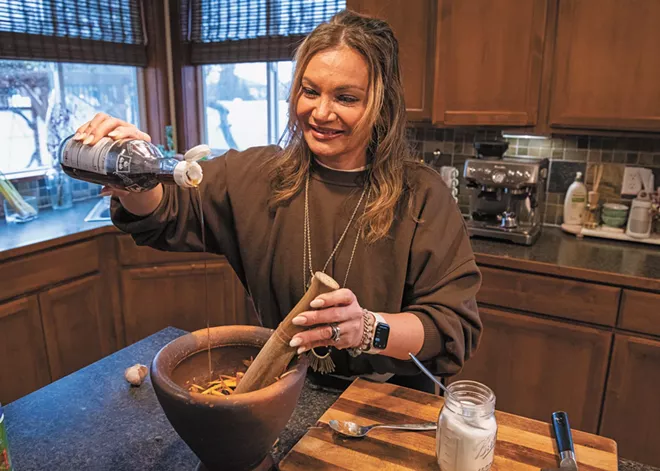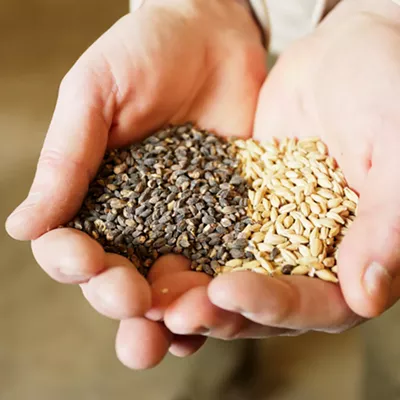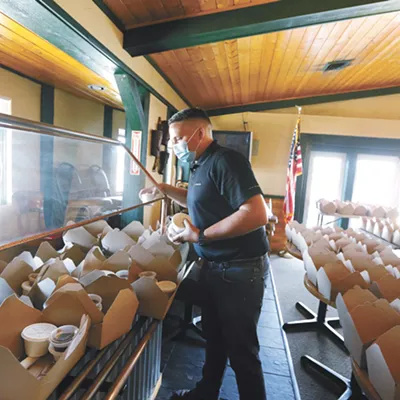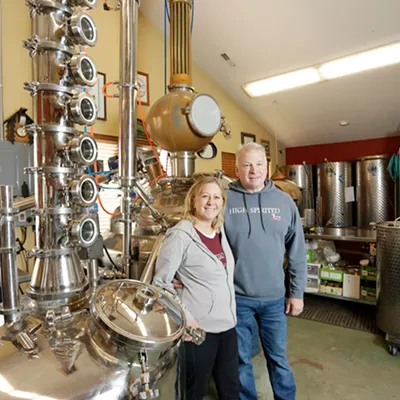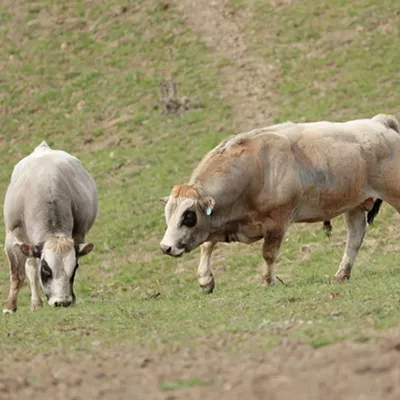In a small Asian market in the middle of Wisconsin, a young Thai girl wandered through the aisles. She couldn't read the signs because she didn't know any English, but she picked out a few familiar items and handed them to the white woman who was with her. They took the ingredients home, and the young girl tried to cook something with them.
"Nothing is good when you're 13," laughs Suwanee Lennon, who was that girl who came to the Midwest from Thailand when she was barely a teenager.
"I brought noodles home, and then I didn't have sauces, I didn't have oil. You learn as you go."
Learn she did. Decades later, Lennon is the author of Simply Suwanee, a food blog dedicated to authentic Thai food, as well as a professional photographer, cooking demonstrator, public speaker and entrepreneur. The daughter of an American soldier and Thai mother, Lennon was raised by her aunt in a leprosy village in northeast Thailand until she was adopted by an American woman when she was 13.
Lennon now lives in Spokane and celebrates both her cultures by teaching Thai cooking techniques to an American audience. She gives classes online and, more recently, during public library events. This Sunday, Jan. 7, Lennon is telling her story, sharing photographs and giving samples of her favorite recipes at the Spokane Public Library's South Hill branch.
Last year, Lennon went back to her hometown in Isan, Thailand, with extra funds to feed the elders of her community. She ended up feeding the entire village for two days. Lennon decided to make a yearly commitment, returning to her roots every spring to feed the people who raised her. At Sunday's event, she's selling her line of original Thai spice blends for home cooks and amateur chefs, with all proceeds funding the meals she'll make for her village this spring.
Today, once leprosy undergoes treatment, it's no longer contagious. But that wasn't the case in the 1950s and '60s when a leprosy epidemic broke out in Thailand. To contain the spread, the government designated specific areas as "leprosy colonies," places for the infected to stay away from a healthy public.
Lennon's aunt and uncle both had leprosy and lived in a secluded village near the Cambodian border. People with leprosy from all over the region came to live there. By the time her aunt and uncle agreed to raise her, they weren't at risk of spreading the disease, though the cultural stigma and prejudice against them remained. Their village formed a tight community, using food to help bridge language and culture barriers.
"The food was very diverse and fusion," Lennon says. "A lot of Laotian influence, also Khmer, and some Burmese, and different regions of Thailand, too. Food was very simple, but also very flavorful, because it was so rural and poor that we had to be creative with our food."
As a young child in Thailand, it was Lennon's job to get up and make rice every morning. When she came to the U.S., she didn't know how to make anything else. But she quickly became homesick for the powerful spices that she took for granted in Thailand. It took her years to find the ingredients and re-create the flavors she knew as a child.
Lennon did eventually come to love pizza and other typical American teenager snacks, but she never forgot Asia. She spent a semester of college studying abroad in Thailand, working with the leprosy doctor who introduced her to her American mother years before. After she graduated, her husband, an Air Force pilot, was assigned to Okinawa, Japan. Lennon started working for a military magazine as a graphic designer and fell in love with photography.
"It's my way of expressing and communicating myself," Lennon says. "When I came to America, I didn't speak English. And as I went along, I just felt like I couldn't communicate as well as I wanted to. I've always been using art of some sort to express my thoughts and feelings."
For years, Lennon spent time as a contract photographer. But in 2019, with her family more permanently settled in Spokane, she started Simply Suwanee, her cooking blog. It was a creative career that allowed her to be home with her two children and reconnect with her roots.
"I was doing wedding and portrait photography, but I just felt like there's no Thai piece in there, and that piece of me was buried and wanted to come out so bad," she says. "So the Thai food blog was like, 'OK, this is a great opportunity for me to learn more about my Thai culture, my Thai food, Thai history, and to share all of that and just an opportunity for myself to grow.'"
Follow Suwanee Lennon's Thai cooking blog at simplysuwanee.com
Lennon has a love-hate relationship with the word "authentic." On her blog, she's clear about the ingredients that will make Thai food taste best and doesn't recommend substitutions. But that often means recipe followers need to shop local Asian markets and sometimes search online for hard-to-get ingredients like cilantro roots, galangal, or kaffir lime leaves. Even then, tropical plants and herbs might only be available frozen, losing flavor and nuance in the freezing process. If you can't go into your backyard to pick fresh herbs, mangoes, jackfruit and dragon fruit, like Lennon could growing up, can you make truly authentic Thai food?
"[Sometimes] I feel like I'm pushing too many hard ingredients or hard recipes or too time-consuming recipes," Lennon says. "I want to know what my audience wants — do they want easy? But I also don't want to sacrifice flavors and authenticity."
The best two ingredients for a beginner Thai cook to have on hand are lime juice and fish sauce, Lennon says. It's an unstoppable combo for salty, sweet, sour and umami. Looking for a recipe to start with? Try larb, a salad with ground meat and fresh herbs, or green papaya salad, the unofficial "official" dish of Thailand, at least according to Lennon.
She's also not afraid to amp up traditional American dishes with Asian flavors. Her kids love her potato wedges, slices thick and air fried with both a homemade curry blend and five spice blend. At one library presentation last year, Lennon taught her audience how to toast and grind spices to make their own mixtures. But if you don't want to search for a dozen different spices and try to hit the perfect balance, Lennon sells her own expertly crafted blends at every demonstration.
Lennon came up with the idea to sell her own spice line when she visited her home village last April. With the little extra money she brought, her extended Thai family worked together to create cooking kits for boat noodles and fish curry that were simple and soft enough for the elderly to eat.
"I was just so blown away by how far money and supplies could go in Thailand. I just took that as a sign [that] I'm going to keep this going," she says.
Her spices allow Lennon to share her expertise and feed the people she loves. Once Lennon finally found the flavors that made her feel at home, she realized that home wasn't limited to one place anymore.
"Food definitely is the link between the two cultures," Lennon says. "In my own experience, I feel like it's a blessing that I have known both sides." ♦
Growing Up in a Leprosy Colony • Sun, Jan. 7 from 1-2 pm • Free • South Hill Library • 3324 S. Perry St. • spokanelibrary.org • 509-444-5300


